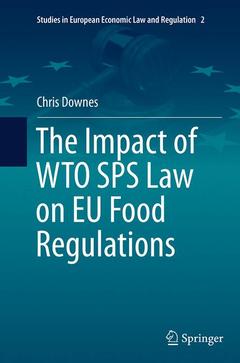Description
The Impact of WTO SPS Law on EU Food Regulations, Softcover reprint of the original 1st ed. 2014
Studies in European Economic Law and Regulation Series, Vol. 2
Language: English
Subjects for The Impact of WTO SPS Law on EU Food Regulations:
Keywords
Antimicrobial Treatment of Poultry; Azo Dyes; Codex Alimentarius; Domestic Food Regulations In the European Context; EU Food Policy; EU Food Regulation; EU Response to Animal Cloning; Evaluation of the SPS Agreement’s Expectations of Science; Food Irradiation; Genetically Modified Organisms; Legal Defences under the WTO; Reviewing Expectations of SPS Constraint; SPS Agreement; Social Value Judgements; Socially Contentious Food Policy; WTO SPS Agreement; WTO Sanitary and Phytosanitary (SPS) Agreemen; What is Cloning?; World Trade Organisation (WTO)
Publication date: 09-2016
Support: Print on demand
Publication date: 04-2014
266 p. · 15.5x23.5 cm · Hardback
Description
/li>Contents
/li>Comment
/li>
This book brings a fresh perspective on the emerging field of international food law with the first detailed analysis of the process and implications of domestic compliance with the World Trade Organisation (WTO) Sanitary and Phytosanitary (SPS) Agreement. It investigates the influence of WTO disciplines on the domestic policy-making process and examines the extent to which international trade law determines European Union (EU) food regulations.
Following controversial WTO rulings on genetically-modified foods and growth hormones in beef, awareness and criticism of global rules governing food has grown considerably. Yet the real impact of this international legal meta-framework on domestic regulations has remained obscure to practitioners and largely unexplored by legal commentators. This book examines the emergence of transnational governance practices set in motion by the SPS Agreement and their role in facilitating agricultural trade. In so doing, it complements and challenges conventional accounts of the SPS regime dominated by analysis of WTO disputes.
It reviews legal commentary of the SPS Agreement to understand why WTO rules are so commonly characterised as a significant threat to domestic food policy preferences. It then takes on these assumptions through an in-depth review of food policies and decision-making practices in the EU, revealing both the potential and limits of WTO law to shape EU policies. It finally examines two important venues for the generation of global food norms ? the WTO SPS Committee and Codex Alimentarius ? to evaluate the practice and significance of transnational governance in this domain. Through detailed case studies including novel foods, food additives, vitamin and mineral supplements and transparency and equivalence procedures, this book provides a richer account of compliance and exposes the subtle, but important influence of WTO obligations.
About the Author.- Acknowledgements.- Abbreviations.- Table of Cases.- Table of Contents.- 1 Introduction.- Part I What Lawyers Expect from the SPS Agreement and Why.- 2 Evaluating the Impact of International Law: A Taxonomy of Analytical Choices.- 3 The Standard View of the SPS Agreement: A Literature Review.- Part II Reviewing Expectations of SPS Constraint on Domestic Food Regulations in the European Context.- 4 Is Science Really The Only Thing That Counts? An Evaluation of the SPS Agreement’s Expectations of Science in the Context of EU Food Policy.- 5 Bringing in the Old and the New: The Influence of the SPS Agreement on the EU Novel Food Saga.- Part III The SPS in Action: The Emerging Transnational Governance of Food.- 6 SPS Mechanisms for a Transnational Approach to Food Governance: Transparency and Equivalence.- 7 Is Codex Alimentarius All Talk? The Importance of Standards in Transnational Food Governance.- 8 Conclusion.- Appendix I.- Appendix II.- Appendix III.- Index.




